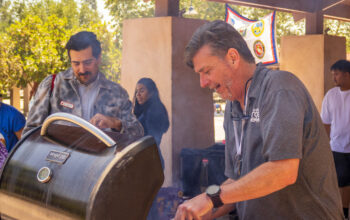An African-American transgender prostitute, fresh out of jail, erupts in a rage after learning her boyfriend/pimp has been cheating on her with a white cisgender woman.
What sounds like an incident from the police blotter is actually the plot of “Tangerine,” a comedy feature film that will launch the three-part Alternative Sexualities: Sexual Diversity Film Festival on March 16. “Secretary” is scheduled to screen on April 20. The third film will be on May 18 and has not yet been determined. All three movies are free to attend and will begin at 7 p.m. in the Great Hall. The movies will be followed by a panel discussion and complimentary refreshments, including popcorn and pizza, will be provided.
The series is the brainchild of Melanie McQuitty, advisor for philosophy, and Ken Windrum, faculty advisor to the Cinema Club, who are coordinating the project. McQuitty wrote her dissertation on philosophy in cinema at Temple University and has taught philosophy in cinema classes, so it is a natural collaboration between the two. They came up with the concept of doing a film series on alternative sexuality by discussing identity and “the others.”
“We talked about exploring the idea of otherness, and this gets explored in various ways in philosophy, the other being that which is outside the norm,” McQuitty said. “This sense of otherness is something that both Ken and I are interested in so we thought it would be interesting to explore films that explore sexuality in relation to other senses.”
Both believe “Tangerine” is the perfect film to begin the festival with because it delves into an array of identities.
“Tangerine” deals with an African-American transsexual prostitute, and the other major character is an Armenian-American cab driver who is interested romantically in transsexual prostitutes,” Windrum said. “The question would be, is this man gay? A man dresses up as a woman to have sex with men- is that homosexual activity? Transsexuals identify as women. There are these questions.”
Those intersections of identities are topics that will be discussed in the panel discussion that follows the film. In addition, Tangerine is a unique film cinematically in part because it was shot entirely on iPhone 5s so there will be a conversation from that angle as well, according to McQuitty.
James McKeever, chair of history, sociology and philosophy department, will be one of the panelists. McKeever recognizes that recent events in popular culture, such as Caitlyn Jenner coming out as transgender, spark discussion on the intricacies of identity.
“The more we discuss the nuances of identity I think that it helps people deal with issues in their own personal life,” McKeever said. “What is going to happen is people are going to analyze their own personal lives a little bit more and be able to discuss it more in public. I think that is where films like Tangerine are really good to talk about the nuances of identity and have an understanding for other people’s lives as well.”
“Secretary” is a dark comedy about a woman who is discharged from a psychiatric institution and begins a sadomasochistic relationship with her boss.
“If ‘50 Shades of Grey’ was a really good film, it would be ‘Secretary’,” McQuitty said. “It is so well done that it comes off differently. It is not only highlighting something about sexuality and sexual behaviors, but It is also highlighting different kinds of cinema and how they address different issues. Sometimes the Hollywood film films are not the ones that are the best at addressing issues, even in a superficial way.”
These films go into great depth on alternative identities. High school and college is a time for people to find themselves and become comfortable with who they are as a person, according to Windrum.
“You have a lot of kids here [at Pierce] who are young and they are discovering who they are. There is a lot of qualities. Who you are as an intellectual, as a religious person, as a political person and sexuality is a part of identity,” Windrum said. “There are people who may not fit into the categories of gay or straight, cause I don’t think gay is really that much of an alternative [identity] anymore, and that is good. It is becoming more and more like a normal identity so to speak, but the kids who are interested in other things have other issues.”
Windrum says a goal of the project is to learn about and approach these topics in a way students will find interesting.
“The thought was let’s present something that will be entertaining and the students will enjoy. Then afterwards, there will be a panel discussion,” Windrum said.



